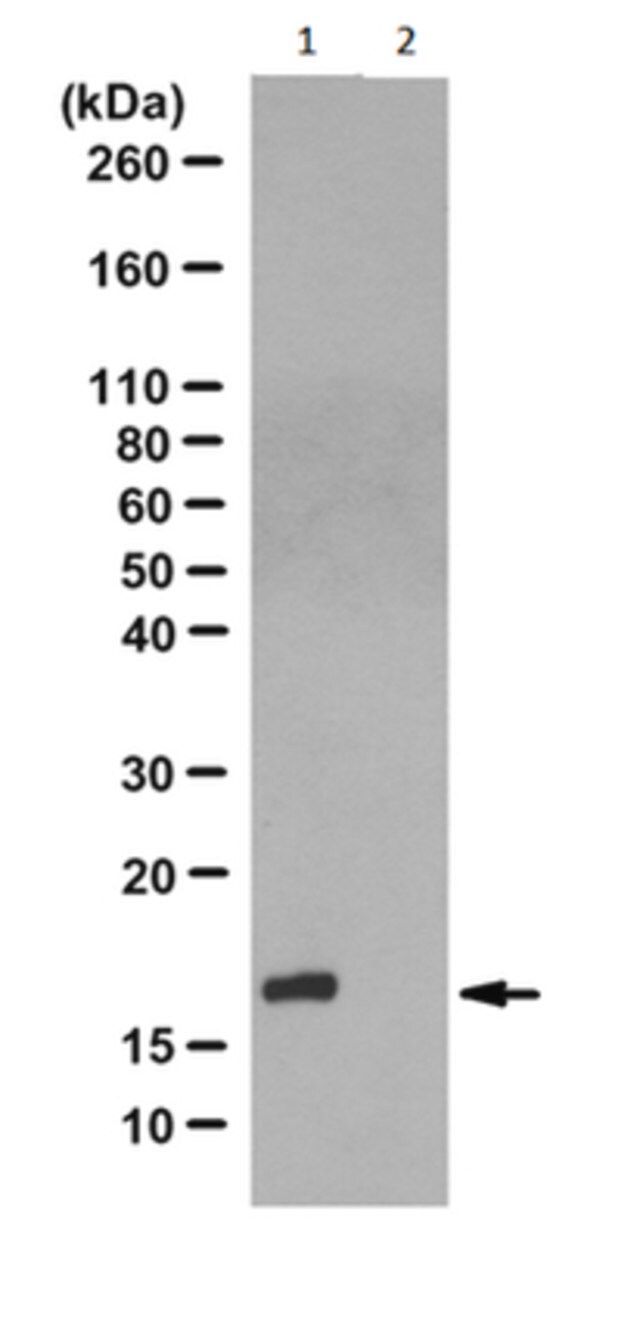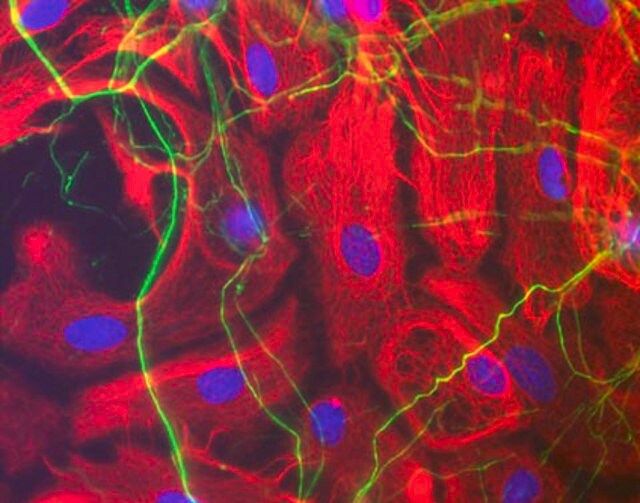产品说明
一般描述
Phosphorylation plays an important role in regulating protein activities and various cellular signaling events in cells. Limited by the tools available for phosphohistidine (pHis) detection, the majority of studies focus on serine, threonine, and tyrosine phosphorylations. Histidine phosphorylation can occur at either N1 (1-pHis) or N3 (3-pHis) of the imidazole ring. The development of peptides containing stable phosphoryltriazolylalanine analogues of 1-pHis and 3-pHis (1-pTza and 3-pTza) allows the generation of antibodies for studying both histidine N1 and N3 phosphorylations in signaling events. There is growing evidence implicating His kinases in cancer and tumor metastasis and the first metastasis suppressor gene identified is one of the two known mammalian His kinases, Nm23-H1 (also known as NME1, nucleoside diphosphate kinase, or NDPK-A). Nm23-H1/NME1 and the closely related Nm23-H2 (NME2/NDPK-B) catalyze the transfer of phosphate from ATP onto Nucleoside-diphosphates (NDPs) through a 1-pHis enzyme intermediate. Nm23-H1/-H2 also possess His kinase activity, transferring the phosphate from the active site pHis onto a His in a target protein. Metabolic enzymes such as phosphoglycerate mutase (PGAM), succinyl CoA synthase (SCS), and ATP citrate lyase (ACL) also use pHis as an enzyme intermediate. Unlike NME1/2, PGAM uses 3-pHis as an enzyme intermediate. In addition to eukaryotes, histidine phosphorylation is well documented in bacterial “two-component” signaling pathways involved in chemotaxis, although the phosphate is transferred from the pHis formed in the receptor/sensor protein to Asp residues of an acceptor response regulator protein, and the receptor/sensor protein essentially functions as an aspartate kinase.
特异性
Target modification is not species specific.
Selectively detects proteins with histidine(s) phosphorylated at N1 of the imidazole ring (1-pHis), but not 3-pHis.
免疫原
KLH-conjugated library of random peptides containing non-hydrolyzable phosphohistidine analogue 1-pTza.
Epitope: N1-phosphohistidine (1-pHis)
应用
Anti-N1-Phosphohistidine (1-pHis) antibody, clone SC1-1 is an isomer-specific monoclonal Ab to specifically detect histidine phosphorylated at position N1. This purified mAb is backed by published data demonstrating performance in Western Blots, immunofluorescence & immunoaffinity purification.
Dot Blot Analysis: A representative lot detected recombinant human NM23-H1/NME1 in vitro autophosphorylation on His118, as well as peptides containing 1-pTza, but not 3-pTza phosphohistidine analogue. Clone SC1-1 is most reactive toward 1-pTza peptides based on NM23-H1/NME1 1-pHis118 sequence, less reactive toward those based on histone H4 1-pHis18 or ACLY 1-pHis760 sequence, least reactive toward GNB1 1-pHis266-based or Kca3.1 1-pHis358-based sequence and not reactive toward phosphorylated tyrosine (Fuhs, S.R., et al. (2015). Cell. 162(1):198-210).
Western Blotting Analysis: A representative lot detected heat-sensitive histidine N1-phosphorylation (1-pHis) in multiple cell lysates (Fuhs, S.R., et al. (2015). Cell. 162(1):198-210).
Immunocytochemistry Analysis: A representative lot detected N1-phosphohistidine (1-pHis) immunoreactivity distinct from that of 3-pHis in 4% paraformaldehyde-fixed HeLa cells and murine bone marrow-derived macrophages by fluorescent immunocytochemistry. The 1-pHis immunoreactivity was found in regions surrounding acidic compartments, but not inside these compartments or nuclei (Fuhs, S.R., et al. (2015). Cell. 162(1):198-210).
Immunoaffinity Purification: A representative lot was cross-linked to protein A resins for immunoaffinity purification of 1-pHis proteins from cell lysates prior to LC-MS/MS analysis (Fuhs, S.R., et al. (2015). Cell. 162(1):198-210).
Note: DO NOT HEAT SAMPLES prior to phosphohistidine detection. Histidine phosphorylation is heat and acid labile. To generate negative control for specificity test, an aliquot of sample can be heated at 95ºC for 10-15 minutes to reverse histidine phosphorylation. Alternatively, an aliquot of sample can be incubated under acidified pH at 37ºC for 15 minutes to reduce histidine phosphorylation. Acidify each 100 µL sample with 25 µL of 1 M HCl before the incubation, then neutralize with 25 µL of 1 M NaOH prior to phosphohistidine detection.
质量
Evaluated by Western Blotting of NME1 autophosphorylation reaction.
Western Blotting Analysis: 0.3 µg/mL of this antibody detected recombinant human NME1 (NM23-H1) with N1-phosphohistidine (1-pHis) in a 5 µg aliquot of autophosphorylation reaction.
目标描述
Variable depending on the histidine-phosphorylated proteins.
外形
Format: Purified
Protein A purified
其他说明
Concentration: Please refer to lot specific datasheet.
免责声明
Unless otherwise stated in our catalog or other company documentation accompanying the product(s), our products are intended for research use only and are not to be used for any other purpose, which includes but is not limited to, unauthorized commercial uses, in vitro diagnostic uses, ex vivo or in vivo therapeutic uses or any type of consumption or application to humans or animals.
基本信息
| eCl@ss | 32160702 |
| NACRES | NA.41 |
产品性质
| 生物来源 | rabbit |
| 质量水平 | 100 |
| 抗体形式 | purified antibody |
| antibody product type | primary antibodies |
| 克隆 | SC1-1, monoclonal |
| species reactivity | human, E. coli |
| species reactivity (predicted by homology) | all |
| technique(s) | affinity chromatography: suitable dot blot: suitable immunocytochemistry: suitable western blot: suitable |
| 同位素/亚型 | IgG |
| 运输 | wet ice |
安全信息
| 储存分类代码 | 12 - Non Combustible Liquids |
| WGK | WGK 1 |
| 闪点(F) | Not applicable |
| 闪点(C) | Not applicable |









